Meet Our 2024 KOEF Partners Impacted by the Extraction of Transition Minerals
13 Desember 2024agnes
.jpg?itok=SzE1MMDq)
The Keepers of the Earth Fund (KOEF) is proud to announce our 2024 partnership with Indigenous communities. At Cultural Survival, we value cultivating long-term relationships with our partners by supporting Indigenous projects on issues related to community empowerment for the defense of land and autonomy; strengthening Indigenous languages, cultures, and knowledge systems; conservation of Indigenous land and livelihoods in the face of climate change; and resistance to mining as a part of the solution to the “green” energy transition.
The Keepers of the Earth Fund is an Indigenous-led fund at Cultural Survival designed to strengthen Indigenous Peoples’ advocacy and community development projects globally. Since 2017, we have supported 365 projects in 41 countries through small grants and a wrap-around approach totaling $2,124,613. Grants go directly to Indigenous communities, collectives, organizations, and traditional governments to support projects designed by them and in accordance with their Indigenous values. Predicated on the United Nations Declaration on the Rights of Indigenous Peoples, Cultural Survival uses a rights-based approach in our grantmaking strategies to support grassroots Indigenous solutions through the equitable distribution of resources to Indigenous communities.
This year, 84 Indigenous projects and collectives were financed for a total amount of $625,585. These funds were sent directly to Indigenous communities, collectives, and grassroots organizations in 25 countries.
The following projects, supported by KOEF in the 2024 cycle, address issues related to the fight against mining and the strengthening of the internal organization of the Indigenous communities in the context of threats posed by mining for transition minerals.
Ambeua Helewo Ruru Foundation, Tobelo Boeng Helewo Ruru (Indonesia)
The Ambeua Helewo Ruru Foundation, founded in December 2023 and based in North Maluku, Indonesia, focuses on the assistance, protection, and empowerment of Indigenous communities. Their project aims to provide assistance to the O Hongana Manyawa community through a conservation and advocacy campaign to preserve the forest in their villages.
Pastoralist People’s Initiative, Rendille (Kenya)
Founded in 2020, the Pastoralist People’s Initiative is a community-based organization dedicated to empowering and supporting Indigenous pastoralist communities in Kenya. Their project targets the Rendille community in the Laisamis and Karare wards of Marsabit County, who face the imminent threat of losing their ancestral lands due to a lack of knowledge about their legal rights. The project aims to raise awareness and understanding of land rights, specifically the Community Land Act of 2016, among the Rendille community to assist them in protecting their ancestral lands from unfair deals and land grabs.
Center for Cultural Heritage of Indigenous Peoples of the North, Yukaghir, Selkup, Mansi, Chulym, Shorian, Kumandin and Dolgan (Russia)
The Center for Cultural Heritage of Indigenous Peoples of the North is an NGO established and led by Indigenous women representing the interests of Indigenous minorities of the North, Siberia, and the Far East of the Russian Federation. Their project aims to build the capacity of activists to engage with companies operating in the green energy sector, particularly those involved in mining in Indigenous areas.
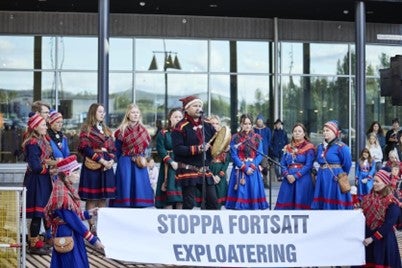
Laevas Sameby reindeer herding community, Sámi (Sweden)
Laevas is an old Sámi reindeer herding community that was legally structured into a community in 1972 following a State request. Their project aims to defend Gabna and Laevas land against mining activities that threaten their reindeer herding communities. They are building a strong community defense focusing on youth empowerment through capacity building and enhancing their media presence to effectively voice their concerns.
Asia Young Indigenous Peoples Network, Igorot and Lumad (Philippines)
The Asia Young Indigenous Peoples Network is an Indigenous youth-led organization composed of 35 members representing different Indigenous Peoples’ organizations and communities. Their project is to mobilize a group of youth and their advocates in the Philippines to create communications materials around the threats and challenges related to mining and other extractive activities, as well as their impacts and effects on Indigenous ways of life, Indigenous and human rights, freedoms, and the environment.
Norton Bay Watershed Council, Iñupiat (USA)
The Norton Bay Watershed Council is a Tribally-owned and operated nonprofit organization whose purpose is to protect the water resources of the Norton Bay Watershed on the Seward Peninsula. Their project aims to evaluate federal climate change mitigation policies impacting Indigenous health and well being in the watershed area. The Council will analyze the potential effects of mining on local subsistence resources, culture, traditions, and economies, and suggest strategies to mitigate these impacts, and use their findings in government-to-government consultations to integrate Traditional Knowledge into federal natural resource management.
Camp Morningstar, Ojibwe (Canada)
Camp Morningstar was founded in 2019 in Manitoba, Canada, and encourages Indigenous community participation in ceremonies, educational activities, feasts, and other gatherings to educate the community on the impact of resource development on biodiversity, wildlife, and lands sacred to the Anishinaabe. Their project aims to unite the three Indigenous Nations of Treaty 5 to consider adopting Free Prior and Informed Consent guidelines for their communities and build a coalition of grassroots organizations to advocate for FPIC implementation. The project seeks to review how the existing consultation system supports Indigenous sovereignty and determine how FPIC guidelines can be implemented.
Community Development Shield, Karamojong (Uganda)
Community Development Shield is an Indigenous-led organization created in 2013 that addresses pressing community challenges by co-creating, initiating, designing, and implementing innovative and problem-solving projects that consider the diverse needs of women and girls. Their project aims to enhance “climate-smart” agriculture practices among Indigenous Elders, women, and youth, and seeks to strengthen communal land associations to defend collective land rights against private mineral exploration.
Aliansi Masyarakat Adat Nusantara Pus Kondosapata’ Wai Sapalelean, Kondo Sapata’ (Indonesia)
Aliansi is an organization born from the collective spirit of the 21 Indigenous Communities in the PUS Kondo Sapata’ Indigenous territory, known today as the Mamasa Indigenous People. Their project focuses on preserving language, arts, and rituals by engaging youth and students in learning Indigenous knowledge, systems, and practices. It aims to foster cultural ownership and passion through translating folklore and literature dually in Kondo Sapata’ and Indonesian languages.
Comunidade Córrego Narciso do Meio, Quilombola (Brazil)
The Córrego Narciso do Meio community in Araçuaí, Minas Gerais, Brazil consists of 60 families of African and Indigenous heritage. Their territory has been certified as Quilombola since 2016 and is led predominantly by women. For 30 years, they have been engaged in a struggle for water security. The goal of their project is to strengthen the community’s ability to preserve their ancestral territory and resources from pressures from nearby lithium mining operations and prevent further displacement to urban areas. With the KOEF funds, the community will implement infrastructure to channel, store, and distribute water from the Calhauzinho Dam to the community.
Colectivo AYENTS, Kamëntsá Biya (Colombia)
The AYENTS Collective is a group of four Kamëntsá Biya Indigenous women in Sibundoy Valley, Putumayo, who have been working since 2019 to revitalize their cultural, linguistic, and artistic heritage through the Tsebionán Curatorial Center. The goal of their project is to prevent the disappearance of the Kamëntsá language, which, with less than 100 fluent speakers remaining, is at risk of extinction in the next 30-50 years. Through the creation of a “Family Linguistic Seedbed,” the collective will implement an intergenerational language learning program that uses holistic and culturally appropriate methods to teach the Kamëntsá language in family units.
National Center of Campesino Patrols of Peru (CUNARC), Coremarcas, Llaucas, Caxamarcas, Chachapoyas (Peru)
CUNARC is officially recognized as an Indigenous representative organization representing Indigenous campesino patrol groups across 22 regions of Peru encompassing 2 million people. The goal of their project is to strengthen Indigenous communities’ resistance against mining projects that have not gone through a consultation process and that threaten their territories and water sources. Through a three-day national gathering, they brought together around 100 Indigenous leaders to share their experiences, develop legal strategies, and establish a unified roadmap for challenging these mining projects at national and international levels, benefiting thousands of Indigenous families in affected regions.
Isinliví Women’s Collective, Kichwa (Ecuador)
The Isinliví Women’s Collective, formed in 2009, consists of 12 Indigenous women leaders from the Panzaleo Kichwa people in Cotopaxi, Ecuador, collectively representing 11 communities. The goal of their project is to strengthen their leadership and ability to defend their ancestral territories against unauthorized mining concessions for transition minerals and hydroelectric projects while improving food sovereignty through traditional agricultural practices. Through information gathering, training workshops, and the recovery of native seeds and medicinal plants, the project will directly benefit 40 Indigenous women and their families who face extreme poverty, land erosion, and chronic child malnutrition within their communities.
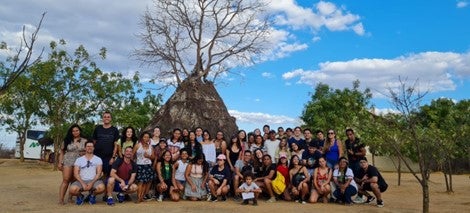
Aldeia Cinta Vermelha-Jundiba, Pankararu and Pataxó (Brazil)
Aldeia Cinta Vermelha-Jundiba is an Indigenous community of 38 people in Minas Gerais, Brazil facing threats from lithium mining expansion in their territory. The project aims to reinforce their territorial protection and cultural practices by renovating their Indigenous association building and eight traditional cabins for cultural activities, and acquiring equipment to support gatherings of Traditional Knowledge holders such as healers, midwives, and Elders. These actions will strengthen their capacity and facilitate knowledge exchange about the impacts of mining, directly benefiting theirs and other Indigenous communities facing similar challenges in the region.
Comisariado de Bienes Comunales de Tilapa, Me’phaa (Mexico)
The Comisariado de Bienes Comunales de Tilapa is the Me’phaa traditional organization administering the land in Tilapa, Guerrero. They represent 3,000 people across 13 localities who are facing threats from mining concessions targeting precious metals and rare earth minerals in their territory. The project aims to strengthen their territorial defense by establishing a community radio communication system to coordinate their surveillance brigade’s response to threats such as illegal logging, hunting, and mining activities.
La Angostura community, Diaguita (Argentina)
The La Angostura community in Catamarca, Argentina is working for the traditional sustainable management of wild vicuna (llama) through a practice called chaku. The project aims to improve their traditional vicuna fiber harvesting practices through the acquisition of mechanical shearing equipment, enabling more efficient and less stressful fiber collection while preserving their cultural heritage and providing an economic alternative to mining projects threatening their territory. The results will benefit their community while serving as a model for neighboring Diaguita communities facing similar pressures.

Qhapaq Pacha Association, Quechua (Peru)
In Ayaviri, the Ccapac Hancco campesino community of the Quechua people, survives. Based out of concern about the loss of knowledge among the youth, a project was created that will allow different generations to rediscover their ancestral knowledge in order to do something about the current human and environmental crisis we are experiencing. Community agroecology workshops and intergenerational dialogues will be held on Andean thought, along with nature conservation rituals and community consciousness in communion with agriculture. To this end, a curriculum was created for the youth team that will be led by the yachaq, or knowledge holders.
Shuar Yapankan Cultural Group, Shuar (Ecuador)
Through dialogues in the Kuamar community in Taish (Morona Santiago), the need to create living memory spaces for the Shuar culture was identified in order to keep it vital. Their project is a documentary that shares the processes of resistance against the urbanization of the jungle and the concession of the Cordillera Wisui territory for oil drilling and mining studies.
San Antonio Community, Jivi (Venezuela)
In Atures/Amazonas, Venezuela, the Jivi community of San Antonio is concerned about the migratory movements that the mines in the Yapacana National Park have generated. People left the community for the false promise of a better life, but military operations and the closure of the mines forced them to return. Now, it is necessary to revitalize the territory and embrace its ancestral knowledge. The community seeks to achieve this through the donation of tools for the field, the purchase of machinery for conuco processing, and the installation of water systems.
Mesa de Salinas Grandes y Laguna de Guayatayoc, Kolla and Atacama (Argentina)
In 2010, the 33 communities that make up the Mesa de Salinas Grandes in Jujuy met to defend their water and territory against the installation of lithium mining, drafting their own consultation protocol for Free, Prior and Informed Consent in accordance with ILO Convention 169. This protocol, called Kachi Yupi, seeks greater respect for the rights of the communities. They plan to make educational videos and podcasts about Kachi Yupi that can be shared on messaging platforms so that the materials are more accessible to their communities.
Tabanok Audiovisual School, Inga and Kamëntsá (Colombia)
Since 2010, 11 Inga and Kamëntsá communities in the Sibundoy Valley and Mocoa, Colombia have denounced the presence of mining megaprojects in their ancestral territory. In 2014, a mining megaproject was stopped through multiple actions, crucially including communication. With support from KOEF, they are training themselves in audiovisual tools and producing a short documentary film in the Amazonian Andean Foothills, where an open-pit mining megaproject is planned to be developed. The film will be projected in different local and national spaces.
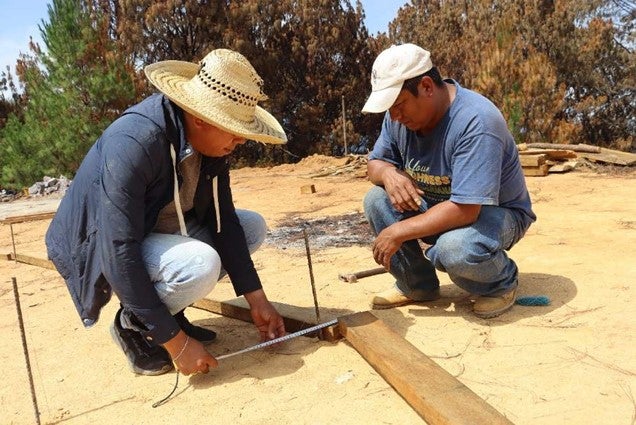
Colectivo Gusanos de la Memoria, Mè’phàà, Na savi, and Nahua (Mexico)
The Gusanos de la Memoria (Memory Worms) Collective is an Indigenous, multicultural, self-managed collective from the La Montaña de Guerrero region of Mexico. They work with children and young people by implementing workshops on literary creation, philosophy, translation, photography, video, and other arts with the aim of strengthening the identity, language, and thinking of their culture. In 2024 they began the first phase of construction of a multipurpose room for workshops and a library in the Gusanos de la Memoria Artistic Residence.
Rondas Femeninas de San Antonio, Quechua (Peru)
In the Bambamarca region, the ronderas have expressed their concern about mining pollution and the lack of action on the part of authorities and companies. In response, they are working on training 40 campesina women on topics related to the values of their community, pollution, climate change, and extractivism. In addition, the members are expected to continue with action projects against climate change and create communication materials such as podcasts.
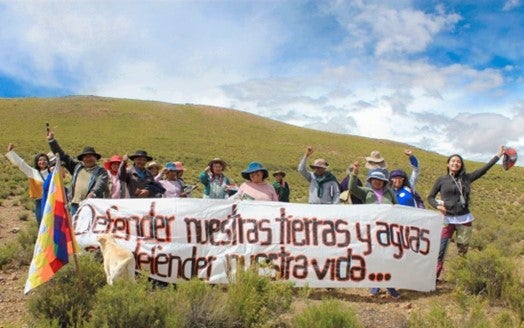
Red Chacha Warmi, Kolla, Quechua, Chicha, Omawaka, Aymara, Atacama, and Afro-descendants (Argentina)
Local governments have favored mining extractivism in their economic policy, exploiting Indigenous territories and attacking their ancestral ways of living. In response to this situation, the Red Chacha Warmi Network supports the Indigenous communities of Jujuy that are fighting against mining by preparing documentation and reports on environmental damage, encouraging the empowerment of warmis and diverse identities, and strengthening links with other communities and anti-extractivist environmental assemblies.
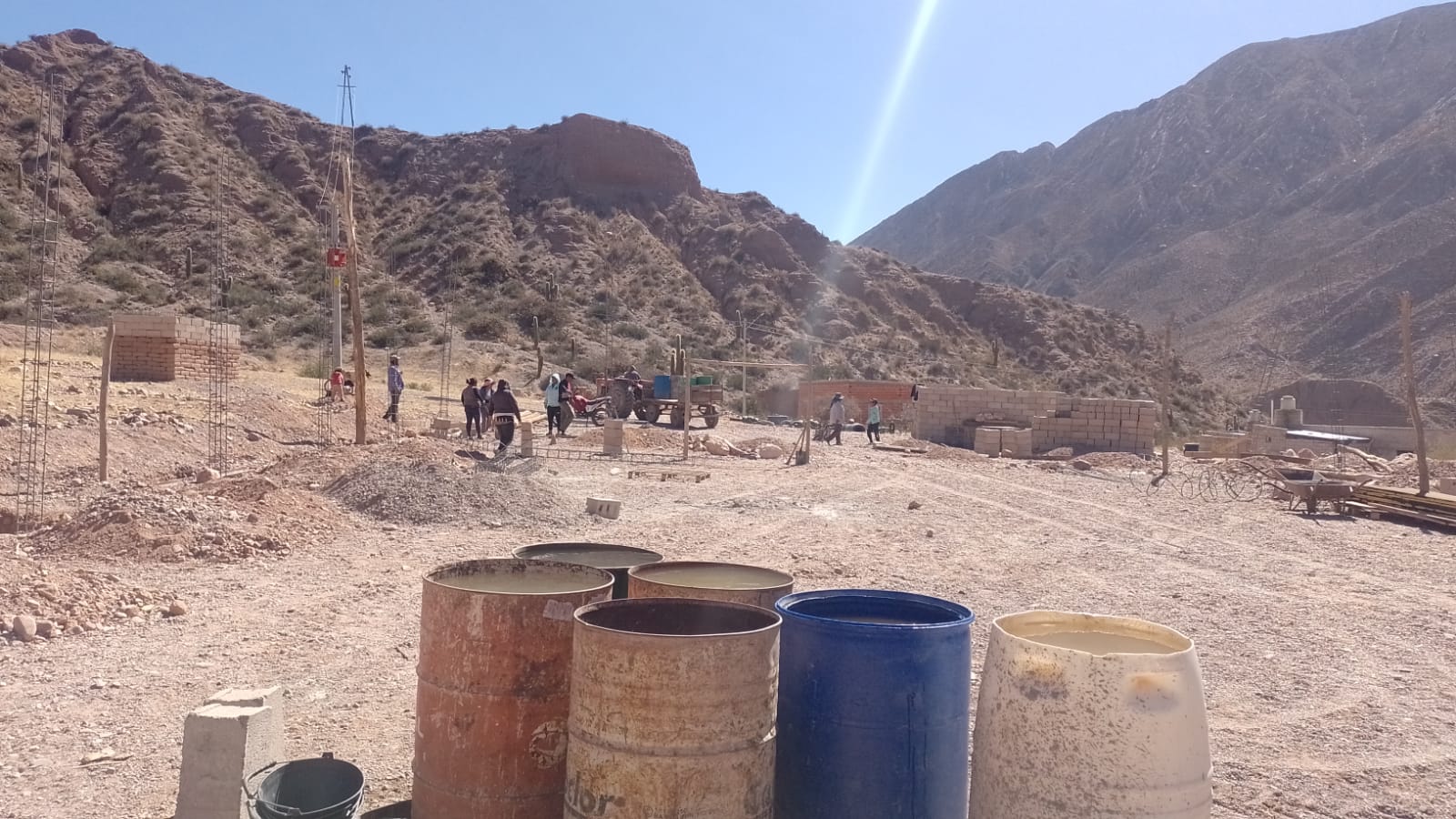
Angosto El Perchel Community, Kolla (Argentina)
Angosto El Perchel is an Indigenous community in Jujuy, Argentina. Their project is to continue the construction of an Indigenous Cultural Space, which is a covered and enclosed space to hold the frequently organized meetings for the Indigenous communities. Public policies in the Jujuy region favor extractive companies linked to the energy transition, making it necessary to have a larger physical space where several communities can meet.
Comité de Unidad Campesina, Maya Q’eqchi’ (Guatemala)
The Campesina Unit Committee works on programs and projects on agrarian, gender, and organizational strengthening and the political participation and rights of Maya and Afro-descendant Peoples regarding agribusiness, mining, water pollution, and the destruction of the environment. Their project will focus on recovering a small part of the forest mass in Izabal by implementing diversified agroforestry production systems in organized communities. The aim is to diversify production on the plots and promote the maintenance of the region’s endemic species.
Indigenous First Nation Advocacy South Africa, San, Khoe, Nama, Korana, and Griqua (South Africa)
From the beginning, the organization has worked to educate its people concerning identity, language reclamation, culture revival, heritage restoration, land restitution, self-determination, and rights. With the support of KOEF, this year will continue with education and raising awareness in communities affected by mining regarding their rights, based on their identity and resource importance, in the western, eastern, and northern Cape and Gauteng Province. Their project is to organize trainings, meetings, and community engagements.
Additional organizations: Mayangna (Nicaragua), Mapuche (Chile), and Khasi (India)
In addition to the projects summarized above, we have supported four projects of the Mayangna in Nicaragua, Mapuche in Chile, and Khasi in India. There, Indigenous Peoples are working in resistance against mining projects but have declined to have their names listed for safety concerns.
